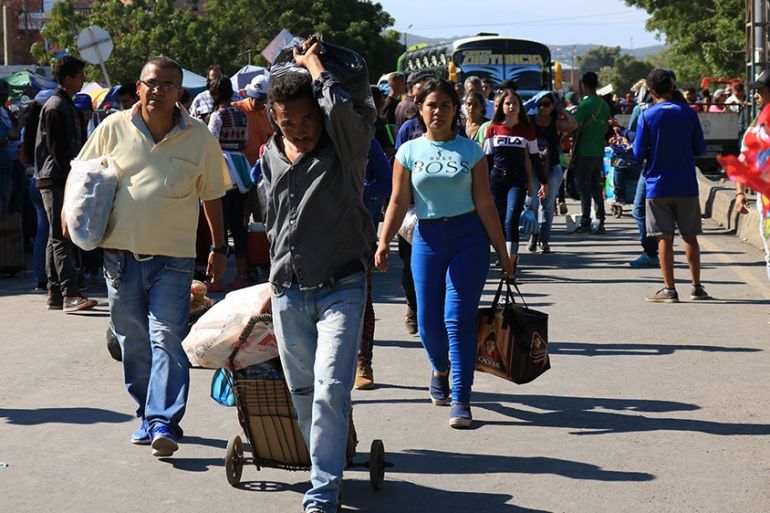On Colombian border, fleeing Venezuelans have little hope
As political crisis deepens, those who have left say even if president has changed, recovery is still years away.

Cucuta, Colombia – Joimar Diaz and her husband had planned and saved for a year to move their two young children out of Venezuela.
On the eve of their departure, massive protests rocked the country while neighbouring nations disavowed the sitting government. For some, it meant hope that the long-spiralling crisis there might soon turn. But for Diaz, it was no reason to stay.
Keep reading
list of 4 itemsChile calls for the extradition of Venezuelans after dissident’s murder
Argentina claims to be sheltering Venezuelan opposition leaders in embassy
Faced with an election ban, Venezuela opposition leader names alternate
“Huge damage has been done to Venezuela. Not just economic, it’s social,” she said standing family and their piled luggage on the Colombian side of the Venezuelan border. “You have to reconstruct an entire society.”
Like millions of Venezuelans, Diaz, 33, crossed the border to escape hunger, sickness and violence at home. No matter who takes the helm of Venezuela, Diaz estimated it would be five to 10 years before the country was fit for her family’s return.
Most days, more than 40,000 Venezuelans cross the international bridge into Cucuta, Colombia, the main route of the Venezuelan exodus. Most come to briefly work or shop for food before returning home. But an estimated 5,000 every day set out to make new lives in Colombia and beyond.
The burgeoning populations of Venezuelan migrants have generated tension, standoffs and even violent clashes in South American nations, which have implored the international community for financial aid to receive the migration.
![Torres (right) hopes to find work in the Colombian capital of Bogota, where the number of Venezuelans has doubled to 280,000 in the last six months [Dylan Baddour/Al Jazeera]](/wp-content/uploads/2019/01/ab7a6c266cd743e8b034a0fe0565a594_18.jpeg)
Marianne Menijvar, Colombia’s director for the International Rescue Committee, said staff have anecdotally noticed an increase in the migration traffic “over the last few days”.
Few Venezuelans at the crowded and chaotic border felt that the raging protests of the day before held much promise for swift improvement in the country.
A group of young adults sat in the tropical shade near the border, gawking at gruesome videos from the protests.
One showed a young man, shirtless and face down in a pool of blood, his back riddled with gunshots allegedly fired by police. Another showed protesters beating a police officer they had knocked from his motorcycle. Another showed a young man boldly confronting police, asking them if their families were also hungry at home.
“All the tinder is set,” said Eric Perez, 34, a former carpenter who now sells bus tickets in the border zone. “It’s just waiting for a spark.”
Such videos, he said, were nowhere to be found on Venezuelan state TV broadcasters, which showed upbeat images of pro-government marches. Citizens take to WhatsApp to circulate their own information.
‘You can’t find salt’
The protests took aim at the regime of Nicolas Maduro, heir to the leftist revolution of his predecessor, Hugo Chavez. Many Venezuelans blame Maduro’s management for the years-long crisis that has seen Venezuela’s currency collapse and rule of law decay while hunger, sickness and criminality run rampant.
“You can’t even find salt,” said Dayena Torres, a 21-year-old Venezuelan on her migration to Bogota. “I was eating white pasta without salt. Sometimes I put mustard on it.”
Maduro blames the United States and other outside powers of waging an “economic war” on the country, aimed at forcing him from power.
A fractured opposition in Venezuela was never able to coalesce against Maduro until this month, when it rallied behind Juan Guaido, a relatively unknown political figure elected January 5 to head the nation’s opposition-controlled legislative assembly.
On Wednesday, Guaido swore himself in as interim president, calling Maduro’s presidency illegitimate. Shortly after, the US, Colombia, Brazil, Argentina and other countries announced their recognition of Guaido as Venezuela’s president, a sharp rebuke of Maduro. Russia, China and Turkey and the top ranks of the Venezuelan military came to Maduro’s defence.
Wednesday’s pro- and anti-government protests delayed 46-year-old Juan Luna’s trip out of the country for hours.
![Luna (right) stands with his luggage near the Venezuelan border, on his way to the Colombian interior [Dylan Baddour/Al Jazeera]](/wp-content/uploads/2019/01/807c6a83ec044a3b8c206d389a6d7ed7_18.jpeg)
The former firefighter sold two motorbikes to fund his migration and he didn’t expect to see his country again for many years. Nor did he have high hopes for its future.
“I’ll be sincere,” said Luna, whose forearm was covered in bus routes and information about his Colombian destination.
“I would like God to help [Guaido] achieve our hopes, but I don’t think he will,” he told Al Jazeera.
“It will only get better if the world sends help, food and medicine, to Guaido. If not, we continue the same.”